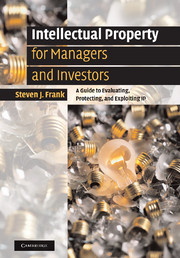 Intellectual Property for Managers and Investors
Intellectual Property for Managers and Investors Published online by Cambridge University Press: 06 August 2009
It wasn't so long ago that intellectual property (IP) didn't much matter to company managers and investors. Copyright was for writers and artists, trade secrets were difficult to protect, and, as for patents, they seemed at best a necessary expense for large technology companies. Not that IP was exactly ignored; epic patent battles followed the introduction of photography, the telegraph, and television, to name just a few disruptive technologies, while the music and broadcast industries struggled over copyright royalties for most of the twentieth century. But few companies viewed IP as a strategic asset. Particularly in the United States, courts historically detected the foul odor of monopoly when asked to enforce IP rights, and the universe of protectible subject matter was limited – software, for example, lay firmly outside the patent system, while the prospects for biotechnology remained uncertain. Lawsuits involving patents were (and still are) enormously expensive, yet few companies licensed their IP routinely and voluntarily. These circumstances left IP uncertain in scope, difficult to enforce, and unlikely to yield an economic return, absent exhausting and potentially ruinous litigation.
As a result, managers spent little time fretting over IP. Often disinclined to dive too deeply into the details of their companies' technology in any case, many simply delegated, trusting that responsibility would reach the sober hands of engineers, scientists, and lawyers padding about their offices in mismatched socks. And why not? Business success seemed to depend no more on IP than the locks on the doors.
To save this book to your Kindle, first ensure no-reply@cambridge.org is added to your Approved Personal Document E-mail List under your Personal Document Settings on the Manage Your Content and Devices page of your Amazon account. Then enter the ‘name’ part of your Kindle email address below. Find out more about saving to your Kindle.
Note you can select to save to either the @free.kindle.com or @kindle.com variations. ‘@free.kindle.com’ emails are free but can only be saved to your device when it is connected to wi-fi. ‘@kindle.com’ emails can be delivered even when you are not connected to wi-fi, but note that service fees apply.
Find out more about the Kindle Personal Document Service.
To save content items to your account, please confirm that you agree to abide by our usage policies. If this is the first time you use this feature, you will be asked to authorise Cambridge Core to connect with your account. Find out more about saving content to Dropbox.
To save content items to your account, please confirm that you agree to abide by our usage policies. If this is the first time you use this feature, you will be asked to authorise Cambridge Core to connect with your account. Find out more about saving content to Google Drive.